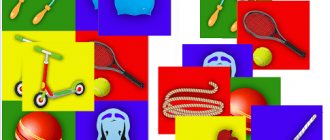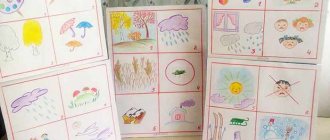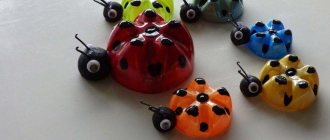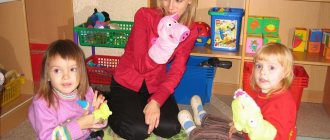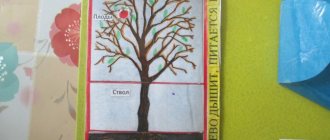From birth, the baby develops, learning about the world around him. An important role in the development of a small personality is played by the creation of a special environment - a space filled with games and activities that are aimed at acquiring new knowledge, skills and abilities. Of particular importance are developmental games - games that help improve fine motor skills, develop thinking, creative imagination, and reinforce the skills of making independent decisions. There are two main principles that are embedded in them and which are fully consistent with the Montessori method:
- learning through play is a consistent path from simpler to more complex;
- Learning with the help of a development tool is carried out independently according to ability - by solving a new problem each time, the child reaches a new “bar” of his capabilities.
Why do we need children's development tools?
Let’s try to break down the generalized answer that we gave above “on the shelves” - this will be useful for parents when creating a developmental environment at home.
- Every new educational game, both in the subject and in the logical part, gives the child new “food” for the mind.
- Activities of this type help the child develop comprehensively (fine motor skills, speech, coordination of movements, logical thinking, creative imagination).
- The conditions set in the development program invariably outstrip the development of the baby’s abilities. It is as if he is gradually solving a new problem.
- By completing tasks independently and once again reaching the “ceiling” of their capabilities, the child develops most successfully.
- By playing educational games with their baby in the home environment, parents, perhaps without realizing it, learn themselves - patience, the need to provide the child with complete independence in choosing decisions and actions where he can and should do it himself. No “mentoring” - only communication and observation!
It is based on the child’s interest and natural desire for self-learning.
It is important for fathers and mothers to remember: they should not force a child to play - just set him an interesting game situation, give him a “beacon”. There are many educational toys of a very different nature, and if the child refuses one, offer him another. At the same time, and by their nature, it is better to alternate such games, without getting hung up on similar and uniform ones, even if they are built according to the principle of steps. And, what is also important, the child himself sets the pace and rhythm of the lesson and has the right to stop it. You should not insist on continuation, so that the child does not lose interest in it and does not carry it out “through force.”
Age-related developmental features
In accordance with the Montessori program, educational games are focused on the age characteristics of children. And they are like this:
- A child’s speech development begins and continues intensively from 0 to 6 years. At 2-2.5 years of age there is a dynamic accumulation of vocabulary, at 3.5-4 years the use of speech becomes fully conscious, by 4-4.5 years he actively uses it to solve his problems, and at 5 years he learns to read (understand other people's thoughts).
- Active development of fine motor skills is typical for the period from 1.5 to 5.5 years. It is closely related to speech development. The child learns to manipulate small objects, comprehends the concepts of part and whole, and his logical thinking develops.
- Sensory senses (vision, hearing, smell, tactile perception) develop sensitively from birth to 5.5 years.
- Perception and establishment of order in behavior, in time, in the environment - from 0 to 3 years.
- Mastering various actions, physical, motor development is carried out in parallel with mental and sensory development, especially the active stage - from one to 4 years.
- The sensitive period of socialization, the assimilation of forms of communication with peers and elders are characteristic of the age from 2.5 to 6 years.
Early Years Education
High level of learning ability . This is the most important opportunity for activities with your baby. The child’s brain is forming, it is very plastic. Therefore, it is during this age period that the child acquires knowledge faster and more effectively than in other age periods.
However, a child cannot acquire all knowledge, but only that which is available to him at this age. In addition, the very form of presenting new knowledge and skills should be adequate for an early age. The speed of passing new material should also correspond to the age and individual capabilities of the child: you need to set a certain pace for the lessons, but you should not rush too much.
Therefore, classes with a child require a thoughtful selection of tasks that are adequate in content and level of difficulty, as well as compliance with the rules for conducting classes with young children. Our book will help you achieve a balance between the opportunities and limitations that accompany a child’s age (second year of life).
Game component of early development . The leading activity of a young child is object-based play. When organizing activities with your baby, it is very important to remember this. After all, if you do not take into account this feature of young children, it is almost impossible to correctly organize developmental activities and achieve impressive results. Let us outline several rules for creating a developmental environment for a child aged 1–3 years.
The baby should have a sufficient number and variety of items to play with: from entertaining toys to educational ones. Of particular importance are multifunctional toys - those with which you can perform many different play actions (matryoshka dolls, inserts, colored cubes, etc.).
In addition to toys, the child should have the opportunity to use a wide variety of household items for play, such as dishes, storage containers, etc. The items with which the child plays must meet a number of requirements:
- safety (for example, do not use sharp, glass, or excessively heavy objects);
- environmental friendliness (items must be made from environmentally friendly materials,
- quality (items must be durable, easy to use);
- novelty (on the one hand, you need to give the child new objects, and on the other hand, do not forget to remove old boring objects and toys, temporarily replacing them with others).
The role of an adult in the early development of a child . In light of the above, one of the tasks of an adult is to provide the child with a subject environment and a constant influx of new interesting objects: select good toys, repair or remove broken ones from use, from time to time put away boring toys, which, upon returning to the child in a few months, will be acquired again. the quality of freshness and novelty.
But the main role of an adult in a child’s objective play is joint activity with the baby. It is necessary to clearly understand that if an adult does not become an active participant or organizer of the child’s object-based play, a real play partner, he will not be able to recognize and assimilate the basic function inherent in the object and the method of acting with it. No educational interactive toys can replace an adult playing with a child - neither in significance, nor in the power of influence, nor in the result of the game, which is ultimately expressed in the child’s level of development, his competence in the environment around him and the world in general (of course, at the level of his age).
The process of a child mastering human speech is also completely built on imitation of an adult: we are given this opportunity by nature - to master speech and learn to actively use it in society, but this can only happen thanks to the people around the child.
Never refuse your child when he asks you to play with him. Don’t forget how quickly time flies: most of our important adult affairs can wait, but a child won’t wait, he needs to explore the world and develop here and now!
Gifts of civilization for a baby . Before you begin developmental activities with your child, you need to answer the question for yourself: what is education? This is the transfer of human experience from generation to generation.
The experience of humanity accumulated over thousands of years is not transmitted genetically, but only through training. Therefore, it is impossible to become a civilized person without a good education. We can say that a child is born a small animal and without special training with the help of other people will not become a person - it will be a little Mowgli in the concrete jungle. Understanding this allows us to realize the seriousness and importance of the issue of development and education of children.
A specialist who constantly works with children can, at one glance, distinguish a child who is not being treated from one who is being treated. The first one has a lack of initiative (after all, he is already accustomed to not paying attention to him), a bored look (the child cannot organize himself, come up with an interesting game, does not know how to get involved in the game that is offered to him), simple manipulations with toys (twirls in hands, knocks, throws, but does not really play, because only an adult can teach this), field behavior (this means that visual images lead the baby: having grabbed one object, he throws it and runs after another that hits in sight).
Kids who are properly trained are completely different: such a kid is full of enthusiasm (he already knows that during the lesson there will be many interesting and exciting games), he is demanding (the kid has experience interacting with an adult and knows what the adult can do, so he asks him a toy, demands to play with him, etc.), he is active and proactive in his knowledge of the world. This condition of the child is, of course, more troublesome for the parents, but good for the child. He is interested in life!!!
There is also a third category of children - those with whom they work, but do it incorrectly, without taking into account the physiological and psychological characteristics of their age.
If a child’s development is based on the type of schooling, and not in play, if they try to teach a child to write, read and count ahead of time, you can completely discourage the child from studying and cause a persistent negative attitude towards learning.
In this case, you need to immediately stop torturing the child, because such study will be of no use anyway. And then offer properly structured activities that meet the needs of his age.
Developers by age
The long-term practice of Montessori teachers shows how effective educational toys are for the overall development of children, starting from a very early age. We will give only certain types of developmental classes conducted in different age groups. It should be noted that in addition to special didactic materials, the simplest household items serve as game elements: cereals, buttons, jars, boxes, and for home activities, it will not be difficult for parents to prepare such material themselves.
From 1 year to 2 years
At this age, a child is interested in everything. The world is being actively explored; the baby needs to touch and taste everything. He enthusiastically plunges into his activities and does them with pleasure. It is important that developmental toys help develop concentration, fine motor skills, and coordination of movements. These activities include:
Drawing on small grains. Semolina or other small grain becomes a “sheet of paper”. You can draw on it with your fingers, leave fingerprints, handprints. Fine motor skills are most actively involved here, which activates several areas of the brain at once, including those responsible for speech development. In addition, the fingertips and the surface of the palm are gently massaged. You can draw with a brush, stick, or other objects, which allows you to develop not only fine motor skills, but also creative imagination.
Sorting, arranging small items into cups, jars, bottles. For this, buttons, beans or, for example, pieces of a mosaic will be useful. And again, fine motor skills actively manifest themselves here, logical thinking develops, and the child learns concentration. You just need to carefully monitor the process - at this age the baby is interested in tasting everything.
In addition, in this age range a child can learn:
- hold the spoon correctly;
- pour water from vessel to vessel;
- close and open zippers, buckles, Velcro, buttons;
- and many many others!
Developmental activities for 2 - 3 years
Around the age of three, the baby enters the peak sensitive period of sensory development. All five senses absorb information from the surrounding world like a sponge. He no longer just wants to touch the object, but also to understand its “filling”: how the latch works, how the lock opens or the clasp unlaces. But many objects can pose a risk of injury. The solution was found by Maria Montessori herself back in 1907: it was she who invented the first busy board - a “smart board”, on which all sorts of useful things interesting for the baby are collected. You can touch, press, twist, and check “how it works” without fear. By mastering new material with interest, the child perfectly develops fine motor skills and learns to logically comprehend the interconnection of processes. A water tap, a clock face, a compass, a telephone dial, switch buttons - the list of items goes on and on.
Parents can make such a board themselves. You just need to exclude the presence of piercing, sharp, cutting objects and take into account the fact that a “smart board” is being made for a boy or girl.
You can also continue, but in a more complicated form, activities with transfusions, pouring and sorting small items, with clothespins and other materials.
Developmental activities for 3 - 4 years old
The child becomes more independent, and his vocabulary is actively expanded. Important points that need to be emphasized are exercises from practical life, classes on speech development, and preparing the hand for writing.
- Practical life exercises (cleaning, watering flowers, cleaning clothes) help the baby feel independent and self-reliant.
- Further development of fine motor skills to prepare the hand for writing. Exercises for opening and closing all kinds of locks, for pouring, sorting small objects are gradually becoming more complex, and classes are carried out on cutting, embroidering, and shading surfaces.
- Speech skills are intensively mastered. The child studies with interest with cards to enrich his vocabulary, participates in games to develop phonemic hearing and articulation, and memorizes poems, tongue twisters, and nursery rhymes.
Developmental activities for 4 - 6 years old
At this age, the basic skills from practical life have already been mastered. From the age of 4, the child begins to show an active interest in counting, as well as in written and oral native speech. Activities such as:
- writing on semolina or sand - this makes it easier and more interesting to improve in writing your first letters;
- composing simple words using the movable alphabet;
- using rough letters to name sounds;
- writing on a blackboard with chalk;
- shading frames to reinforce skills.
Reading. In accordance with the Montessori method, teachers turn to it only after making sure that the child has mastered the sound designation of letters and can form simple words from the alphabet. Your child will be interested in activities such as:
- phonemic games with naming the first letter with which the object begins;
- naming signatures on cards with various pictures and boxes with figures;
- reading simple tasks and completing them;
- reading simple books, including homemade books.
The child will also take with interest lessons with abacus, which will gradually become more complex by the age of six. During the same period, he actively mastered various creative techniques - in accordance with the Montessori method, the emphasis is not on the images created, but on the techniques, variety of materials and tools used. And, of course, the world around us is being studied more and more actively: maps and images by category (animals, countries, cities, etc.) are used in the space zone; all kinds of experiments that allow us to visually comprehend various phenomena are of great interest. Children who have already mastered writing skills can write down the results of their observations or experiments.
Early Child Development Concept
When working with a child, an adult must understand well what he is doing and why. Even with the most advanced early development techniques, the results will be limited if we do not understand the ultimate goal of our efforts.
The goal of a child’s early development is not at all to fill him with as much new information as possible.
A large amount of information does not at all give a child a unique chance to develop his brain to the fullest and gain that very strategic advantage of human consciousness, which no living creature except humans has.
The ultimate goal that parents of children set, albeit not always consciously, is to increase the child’s chances of becoming happy. And the idea of happiness in the modern world is success, competence, and self-realization in society.
It is very important to realize this veiled goal - in this case, you can provide the baby with the best situation for development.
How to create a developmental environment for a child and organize developmental activities?
It is necessary to give the child a picture of the world around him . This means that the baby must be provided with sufficient quantity and quality of information about the world around him. It is important not just to give scattered information, but to create a “university for kids” (it was on this principle that Soviet education was built, which was not without reason at one time recognized as the best in the world).
Information for training must be clearly selected, verified in its volume and quality, and must give an idea about the main aspects of people’s lives, about living and inanimate nature.
This also includes the other side of the issue: we live in the age of information technology and the amount of information surrounding each person is enormous. In order for the baby to develop harmoniously, you will have to spend a sufficient amount of time and effort to prevent harmful, unnatural, scary or immoral information from influencing the child’s consciousness.
The main task of parents is to gradually, but regularly tell and show their child interesting and entertaining things about the world around them.
Information about the world around must be clearly structured, differentiated and systematized . Only in this case “the puzzle will be completed” and a clear and understandable picture of the world will be formed in the child’s mind, which will help him in life.
Another analogy can be drawn. Imagine that a child’s education (the process of accumulating knowledge, skills, abilities) is the creation of a library, where books are knowledge and skills, and the child’s brain and memory are the library premises. So, you can dump books in a heap in the middle of the room. The knowledge itself remains valuable and useful, but using it when necessary becomes very difficult, if not impossible.
But you can do it differently: first build cabinets, racks and shelves, number and designate what will be on these shelves, and only then gradually place books of knowledge on them. In this case, the process of accumulating and using information is greatly facilitated; such information is not dead deposits - it is active and can be used at any time.
So, in my opinion, creating such a base, a foundation that can be built upon throughout the rest of your life, is one of the main tasks of a child’s early development. And it’s better to do everything right right away, so that you don’t have to redo and rebuild later.
Information about the world should be varied, voluminous, and diverse. We must keep in mind that information about the world has a different essence and nature: there is pure information, and there are material objects - this is the world of toys, objects, pictures.
The child should receive sufficient quantities of both. For example, you can’t just talk to your baby; our stories about the world must be supported. To do this, we show the baby pictures and videos, play with toys and objects, observe natural objects and objects created by human hands.
One of the main tools for understanding the world is speech . In order for various sensory information about the world, obtained through the senses (vision, hearing, touch, smell, taste), to gradually become ideas, it is necessary to designate them using words.
So, if we play with a child, it should not be silent manipulation of objects - the adult names objects and their signs, comments on the entire process of activity.
It is very important to learn how to speak correctly with a child: speech should be simple (short phrases), clear (do not contain contradictory information), brief (you don’t need to say a lot, speech and the information it carries must be dosed in accordance with the age of the child), conveyed information must be correct (information must be relevant and correspond to modern scientific ideas about the world).
Education must be continuous . This means that you need to work with your baby regularly - this is the main thing. At the same time, you should not strive to give as much knowledge as possible at this tender age: you need to study in moderation, not to overdo it, otherwise you can completely discourage the child from learning.
To build a child’s education system, you need to have a plan, namely, draw up a program for his development. This must be done competently, i.e., select only the material that is really necessary and is perfectly absorbed at this age, while strictly dosing its quantity.
After this, you need to calmly follow the plan, and the result will not be long in coming. In addition, continuity of education is necessary - a harmonious transition from an early age to preschool, and then to school, without contradictions in the content and method of presenting knowledge.
Visible learning results are not the main thing . It must be taken into account that not in all cases the results of a child’s education become immediately visible. Visible results, when a child can demonstrate his erudition and skill, are, of course, a pleasant bonus for parents for their efforts, but still not the main result of learning at an early age.
Our main task is to lay the right foundation of education, no more and no less. However, many parents cannot get rid of the habit of comparing their child and his level of knowledge with other children! In addition, many people want to demonstrate the success of their child. This is the wrong motive, distracting from the main goal of the child’s early development.
Without concept there is no good education . When developing and teaching a child, we must clearly understand and realize why we are doing all this. In order to develop a child, we ourselves, adults, must be able to “look at the world through a telescope and a microscope”: on the one hand, see details, imagine the content and principles of operation of individual components of the world, and on the other hand, be able to see the overall global picture.
In other words, we must “ think globally and act locally .” When teaching a small child, on the one hand, give him basic information, speak in simple words, pay attention to interesting details. On the other hand, keep in mind the main goal - laying the foundation of education. If you keep your focus, it is easier to go in the right direction and not go astray.
Perhaps someone will be surprised after reading these lines: why such difficulties, this is a small child, it’s easy to teach him. You need to teach your child correctly from the very beginning, and to do this you must first understand the goals and objectives of the child’s early development, and only then begin to achieve them.
The importance of developmental activities according to the Montessori system
In a small material it is not easy to cover the entire range of possibilities and discoveries for a child that the Montessori child development program offers. Developing comprehensively, the child gains practical life skills; through tasks, games and exercises, his sensory, speech apparatus, logical and creative thinking are improved.
However, the most important thing that a future schoolchild gains is internal independence, independence in choosing decisions, a willingness to work and achieve results and independently find and correct his mistakes - everything that is necessary for the formation of a full-fledged personality. It is no coincidence that all of the listed and other Montessori developmental activities are based on the key principle of this direction in pedagogy: “Help me do it myself.”
